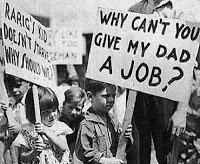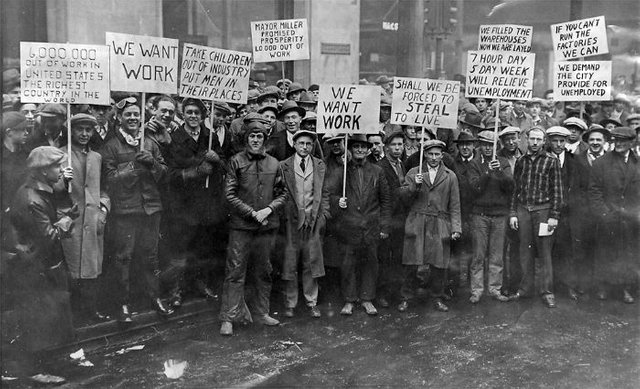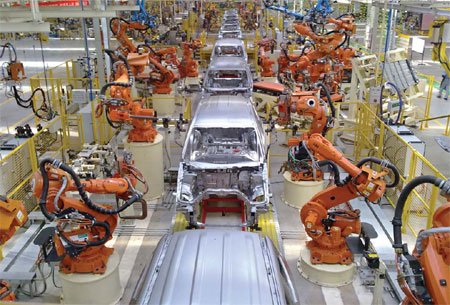
The idea of a job guarantee is nothing new. As far as I can tell, the idea was first put forth by Louis Blanc in The Organization of Work in 1839. When unemployment increases, some people have suggested that it would be proper for the government to step in and create more jobs. Personally, I don't support the idea. As a left-libertarian, I see liberation from work as being of extremely high importance.

Under capitalism, the majority of the wealth tends to accumulate into the hands of a few privileged people at the top, and the rest of us get left behind. The wealthiest people in our society usually either enjoy the privilege of some sort of monopoly or else inherited a great deal of wealth and privilege from someone who enjoyed such a monopoly. All private property over land is a monopoly privilege. The property owner is allowed to monopolize his land and the natural resources found therein. If there happens to be gold or oil on that land, the property owner will become rich beyond compare. Bankers and descendants of bankers enjoy the benefits of wealth accumulated through a money monopoly, since the bankers were/are the only ones allowed to create money. Similarly, certain people have become wealthy because of the artificial privilege of owning a patent or copyright. If I build a machine and patent the idea, I can prevent a person on the other side of the country, who doesn't even know about my invention, from selling his own similar invention which he came up with independently entirely through his own ingenuity. I can allow him to sell his machines and demand a share of his profits or I can keep him from selling his product at all and enjoy a monopoly for myself. These artificial property relations, created by legislation and maintained by adjudication and law-enforcement, create inequality. It is such legal privileges and artificial property arrangements that allow some people to accumulate large amounts of wealth while others go without.
Historically, the legal privileges that allow for high capital accumulation were granted by governments to certain exclusive groups of individuals. At one time, people enjoyed the commons. Land that was not privately owned was free for everyone to use. Everyone enjoyed a right of usufruct upon the land. The average man could graze his cattle upon the commons, build a house on un-owned land and acquire it as his own, and even forage for fruits and berries. With the enclosures in England (and parallel scenarios everywhere else), the government took the commons and gave it over to the feudal lords as landlords, granting them an artificial property right over the land. The people that lived on the land, grew crops on the land, and grazed their cattle on it were then subjugated and turned into serfs. They now had to pay rent to the landlord, even though the lord did not produce anything or contribute anything of value to society. The descendants of the feudal lords became capitalists, using their accumulated capital, which they got entirely from artificial legal privilege and exploitation of the serfs, in order to buy the land, buildings, and machinery used in factory production. With the Industrial Revolution, capitalism was born as feudalism repackaged! The old feudal lords gave way to owners of capital, who ended up investing in machinery and corporations. The serfs ceased working on the land in an agricultural capacity and began working in the cities as wage-slaves. Wage-slaves are not truly free because they, unlike the landlords and the capitalists, don't own any productive property that can provide them with unearned income. They have to sell themselves to "employers" in order to make a living.

We have a world divided into haves and have-nots. The people at the top were given a head-start. And the whole system is riddled with obstacles and barriers to entry, which makes it very difficult for a have-not to become a have. The reality is that the vast majority of individuals who are born to wage-slave parents will die as wage slaves. The vast majority will not succeed at overcoming the obstacles and find themselves becoming wealthy or even well-off. As long as a few people at the top are allowed to hoard all the wealth, it's actually mathematically impossible for everyone, or even most of us, to succeed. There's only a certain amount of land and money available, and we're all chasing after the little bit that "they" allow the rest of us to play with. The haves are living in post-scarcity, but their hoarding of resources creates a condition of artificial scarcity for the rest of us! For most of us, there isn't enough wealth to go around. In order for Mr. Smith to be a successful store manager, Mr. Jones must be a homeless beggar. The have-nots compete with each other, which makes us all worse off. If we all worked together, things would be different.
To make matters worse still, the haves compete with each other too. Capitalistic competition causes corporations to put other corporations out of business. Walmart puts Marsh out of business. Bigger corporations will out-compete smaller corporations. Large corporations tend to buy up smaller companies. The end result is an inherent tendency towards the development of monopolies or oligopolies in every industry. The same wealthy folks end up owning all the different companies. Whether you're buying breakfast cereal, gasoline, corn, or pesticides, the Rockefellers are getting a cut of the money. Feudal and capitalistic property arrangements have led us to where we are today. The competition between the haves has led to the destruction of many capitalists. We have now reached a point where just 5 to 8 individuals―individuals, not families or companies!―own more wealth than the bottom half of the entire world population! But even the remainder of the wealth for the bottom 50% is not even remotely evenly distributed. The majority of that wealth is hoarded by the less wealthy people among the wealthy. Countless people starve in Africa so that some other people can have the luxury of owning toilets made of gold. The majority of those who aren't starving in the world are slaves or wage slaves so that landlords and capitalists can relax or party in luxury without having to work for a living.
The anarchy of production under capitalism leads to overproduction and/or underconsumption. The term "anarchy of production" is a term used by socialists to refer to the chaotic way in which the organization of production and consumption takes place in capitalistic societies. The term was made popular by Karl Marx, but the idea was already expressed in the works of Louis Blanc and probably in earlier socialist literature. Under capitalism, there is a fierce competition to outdo everybody else on the market. Instead of producing what people need and want, as was done under primitive communism and medieval distributism, companies now produce as much as they can afford to produce, regardless of whether there is any demand for the product. Corporations now try to manufacture demand after the fact. Thus, the car companies and cell phone companies produce vehicles and phones that nobody really wants, then they try to artificially create demand for their products through advertising. They put commercials and ads everywhere in order to brainwash the masses into believing that they need new phones, new cars, new toys, new clothes, etc. Occasionally, companies produce way to much, resulting in a bust or economic recession when they can't successfully convince enough people to buy their products. A recession basically results from a disequilibrium of supply and demand. When banks and governments create artificially low interest rates and easy credit, it tends to encourage malinvestment by misrepresenting market signals. This causes overproduction throughout the economy. This phenomenon is often referred to as a crisis of overproduction. Various manufacturers of various products will overproduce, creating a general glut on the economy. When they can't manufacture the demand to sell off their excess product, business goes sour. In order to guarantee profits, companies throughout the economy will cut jobs. This results in a general increase in unemployment.

In recent times, unemployment has become a problem in its own way, apart from economic crises. Automation and outsourcing has caused a permanent rise in unemployment. There is no need for everyone in our society to be working 40-hours a week anymore. If there were, there would be jobs for everyone. Capitalism is a system based around the rule of capitalists. The two defining features of capitalism are (1) the accumulation of land and capital into the hands of the few, so that most people are deprived of ownership of any means of production, and (2) a large body of dispossessed masses with no option other than to sell their labor to capitalists on the wage-labor market. Thus, capitalism is a system dominated by a few owners of land and capital (capitalists), wherein the vast majority of people are subjects employed by the ruling elite as wage-slaves. When automation and outsourcing make unemployment permanent, the entire structure of the capitalist system becomes unstable. A system based on wage-slavery can only persist if there are jobs available in which to employ the wage-slaves.
The suggestion of a job guarantee program is meant to mitigate the negative effects of failed capitalism. However, this proposal does not seem desirable to me at all. Sure, it is better than just letting the people starve. However, there is a much better solution that we should pursue. I'll remind you of two facts: (1) that corporations and the people that own them make ridiculous amounts of money and can afford to pay their employees more, and (2) that there is no longer any need for the majority of people in our society to be working 40-hours a week. A job guarantee program is merely a Keynesian band-aid used to prop up a failing capitalist system. The only permanent and ethical solution is a socialist one, a step outside of the realm of failed capitalism. We need to reduce the length of the workweek and offset it by a corresponding increase in the minimum wage. If half the population was unemployed, you could return to full-employment by cutting the workweek in half and doubling the minimum wage. This would return us to full-employment without harming any of the people already employed, it would grant everyone more leisure time, and it would affect a more equitable distribution of wealth since it would require the people at the top to stop hoarding as much wealth. The corporations and capitalists would have to hoard less wealth since they would have to spend more in order to maintain their businesses operating at the same capacity as before.
Furthermore, considering the degree of wealth inequality, it would be beneficial to further redistribute wealth downwards. It is no injustice to ask the über-super-wealthy to pay higher taxes and settle with only being super-wealthy. And this redistribution of wealth can be rationally and ethically justified.

In a state of nature, there is no system of property; no titles or deeds, no police to enforce property claims; no courts to help adjudicate and enforce contracts, no social infrastructure―roads, public transportation, schools―; no system of currency, etc. Without these things which are given to us by society, there could be zero profits for corporations and landlords. Historically, the institution of property has been justified on the grounds that an individual is entitled to the entire product of their own labor. This notion has as its corollary that no one is entitled to the product of anyone else's labor. If a land speculator buys land and does nothing to it (he doesn't work the land, improve it, or even ever step foot on it or see it with his own eyes), the value of the land will still increase as population in the area increases. As a community develops or grows in the area, society creates a lot of things that increase the value of the speculator's land. The new roads, new schools, new grocery stores, subdivisions, restaurants, and gas stations all drive up the price of the speculator's land. The land speculator can then, without having contributed any labor of his own, sell his land at an inflated price and confiscate the added value produced by the community as his own personal profit. Since no one is entitled to the product of other individuals' labor, and the majority of increase in land value is always due to social progress and growth, it follows that the community is entitled to a share of the added value produced by society itself. Thus, the community ought to impose a land value tax on the value of all land, minus the value of structures. The community should then divide up the revenue produced through this tax and distribute it out evenly to all citizens as a social dividend. I propose a 10% land value tax.
As with land, so with industry. No business could succeed without the institutions and infrastructure created by society and government. Without the government's money, there would be no market. Without police, there would be no enforcement of property claims. Without courts, there would be no enforcement of contracts or adjudication of disputes between parties. Without these institutions, a market system would neither function nor exist. Without roads, consumers could not come to buy the products at the big retail stores. Without public transport and the interstate system, the workers could not come to work. Since society and government have given us the institutions and infrastructure that allow for the accumulation of wealth (since wealth accumulation is largely the product of societal labor and owes its existence more to society than to the ingenuity and labor of the private individuals who accumulate wealth), it follows that society as a whole is due a share of the accumulated wealth. The community has a claim to some share of ownership of all industry. It follows that the community is rightly due a share of the profits of every industry. I propose a progressive tax on income (both individual income and corporate income, since no income is possible apart from society). The rate of taxation should start at 10% and then go up from there. Corporations and individuals who make more money should pay not only more taxes but also a higher rate. Suppose that one person makes 10,000 dollars a year and another makes 10,000,000 dollars a year. A flat tax of 50% would impoverish the one but still allow the other to live in luxury beyond belief! A flat tax is not a fair tax. A flat tax creates an unfair distribution of the burden of taxation. The revenue from income/corporate tax should be divided up evenly and distributed back out to the populace as another social dividend.

In such a system, society or government would be treated as a corporation that owns (or partially owns) all land and industry and is, therefore, entitled to a share of the profits. However, society is nothing more than a collection of individuals. What this means is that each individual in society must be regarded as a shareholder with some just claim to a share of the social wealth. The social dividend is this share. This model would provide every member of society with a citizen's dividend or universal basic income. With a universal basic income, people would be able to be more picky about employment. The problem of wage-slavery would be eliminated overnight! This would cause wages to rise, which would encourage corporations to automate more industries and eliminate as many jobs as possible to cut cost on labor. But this process would in turn increase profits, which would increase the social dividend or basic income of all the members of society. This whole process would ultimately usher in an era of fully-automated luxury communism. No one would have to work for a living and everyone would be free to pursue their own interests. Instead of working, people can take up hobbies: learn new languages, learn martial arts, take up sports, attend festivals and social events more regularly, read more books, continue their education longer, and just be free to enjoy their lives for a change.

Good job, ekk, this one's language was far less academic and far more readable, for me.
Henry George had a good idea, that is probably why nobody has heard of it.
Downvoting a post can decrease pending rewards and make it less visible. Common reasons:
Submit
Great post mate, it still boggles me how capitalists think they're going to get past this, as if they complain now, if they don't do what we, the majority, say then, well, lets just say people aren't going to take kindly to being told to die in the streets because we don't need you anymore :)
Downvoting a post can decrease pending rewards and make it less visible. Common reasons:
Submit
Would have upvoted if written without those italics.
Downvoting a post can decrease pending rewards and make it less visible. Common reasons:
Submit